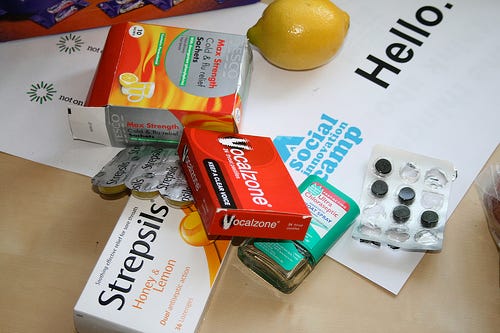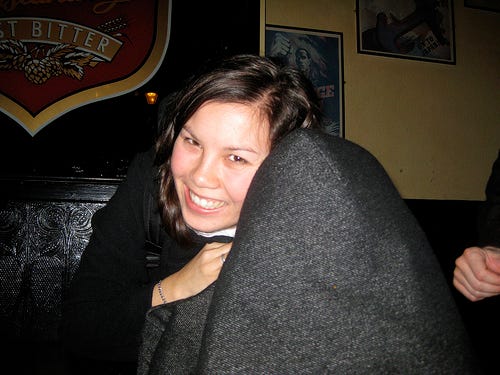Wednesday next week is going to be a busy day. During the day it’s Bettr (co-organised by Beanbag and School of Everything) where we’re getting together as many start-ups working on revolutionising education as possible. It’s going to be an unconference so no big speeches. Then in the evening we’re hosting a Social Innovation Camp Meetup all about education start-ups too. It does seem like the kind of technology and education world that we’re working in with School of Everything is an area that’s hotting up. That’s a very good thing.
Tag: Social Innovation Camp
Don’t throw sheep
It’s not big and it’s not clever as I point out on the Guardian’s PDA Blog today. I should also say that the idea really comes from a far cleverer person than me. Tim O’Reilly uses it in this fantastic talk.
Strange but wonderful
Great quote from Anna in her summing up of Social Innovation Camp.
Something strange happened: 80 individuals gave up their weekend to come and spend two days working with a bunch of people they’d most likely never met before for no real financial gain simply to take part in an unusual hybrid of collaboration and competition, working on things that were often way beyond their normal field of experience and pitching in in every way they could. It was an intense, tough, sometimes stressful, but often passionate, creative, humbling and inspiring two and a half days.
Social Innovation Camp — The Revenge

Social Innovation Camp 2 was a roaring success. The winners were (drumroll please), Good Gym and in second place Useful Visitors — both fantastic projects. It was very close though. Any of the projects could have won — there was just an incredible level of talent and hard work over the weekend.
The whole thing was masterminded by the brilliant Anna Maybank and Katherine Hui. It’s so much more than “just another event” as anybody who has been will tell you and that’s because of all the hard work Anna and Katherine have put in. They make a fantastic team (even if one of them is photoshy).

SI Camp Prediction Market
Because I’m intrigued by prediction markets (and love hubdub as a company) I’ve set one up for SI Camp. All the details of the teams are available on the Social Innovation Camp site.
Social Innovation Camp: Which project will win at the end of the weekend?
And the finalists are…
It’s been so much fun watching Social Innovation Camp take on a life of its own. 115 ideas submitted and last Friday our judges chose six to go through to the final weekend. And they are…
A tool to help people take control of junk mail: Going Postal aims both to stop junk reaching your letter box, as well as offering companies alternative ways to get their advertising out — which is good news for the trees that are used to produce the 550,000 tonnes of paper wasted on unsolicited mail in the UK each year.
What if travelers brought more than cash to the countries they visited? You could harness the skills, talent and knowledge of those visiting other countries — whether they’re on business, visiting relatives or simply tourists. Via the web, universities could find visiting professors, hospitals could find visiting nurses, feeding centres could meet five star chefs and Joe the plumber can fix the drains in an orphanage. It’s a new approach both to international volunteering, as well as tackling the brain drain many countries are suffering as they loose talent and skills to migration.
The rush hour’s bad enough for those who have only a bag and umbrella to carry around. But how do you negotiate a city’s transport system when you’re not able to keep up with the commuter scrum? AccessCity aims to develop a site to enable a user-generated view of London (in the first instance, but with the ability to be rolled out nationally and beyond) from an accessibility perspective: helping those who are less able to get around — due to physical disabilities or impairments, or if they need to take children with them — and highlighting what needs to be improved to make simple journeys less of a hassle.
There’s been increasing emphasis on how you give users themselves greater control over the social care they receive in recent years — it’s a huge social and political issue. Visualising Community Need is a project to help people map their own care requirements and use this information to get care providers to better understand the needs of those they are supposed to be serving — turning the system of social care on its head.
People all over Britain run, jog and lift weights. The Good Gym aims to make it easy for people to channel this energy toward social good. The idea is to get fitness fanatics to incorporate visits to isolated older people or the delivery of useful items to dependent individuals into their exercise routines.
Etsy, but for vegetables. This idea uses an online market place to bring together people who grow food in their home, allotment, small holding or farm with people who want to buy locally produced, natural, wholesome foods — just like Etsy has done with handmade craft goods. So there’s less air miles in our food and we know exactly what we’re eating and where it’s coming from.
Last night we got the people who proposed them to come along and explain all at our meetup at the Hub in Kings Cross. Perhaps my favourite moment was when James described one of his feature ideas for Vegsy as ‘Betfair for potatoes’. Anna asked him what had inspired the idea and he replied in an instant ‘ I really like potatoes’.
There’s a twist to all this though. The judges couldn’t decide between four other projects which they so we’ve had to put it to a public vote to see which will be the seventh project at Social Innovation Camp for the weekend of 5–7th December. You can help decide here.
Practical Optimism
A few weeks ago I had an argument about the future of the human race that baffled me. I won’t say who with, but he’s an environmentalist of note (who is in his 50s I guess). It went something like this:
Him: We have a problem.
Me: Agreed.
Him: It’s really bad.
Me: Yep.
Him: You should be really scared because you’re under 40.
Me: Not really.
Him: But unless we convince people that it’s really, really bad nothing will change.
Me: I’m not so sure — I don’t think scaring people makes them change.
Him: How do you expect governments to regulate the problem unless people are really scared?
Me: I don’t assume that governments will do anything. I think fantastic ordinary people will create sustainable ways of organising themselves and the planet’s resources. I’m sure governments will catch up in the end but there’s no point waiting around.
At that stage we had to agree to disagree. He believes pessimism will save the world and I don’t. I’m an optimist — probably with a little bit of anarchist libertarianism thrown in. The two don’t really mix.
The last couple of months have been the most economically turbulent of my lifetime, the future is the least certain of any I can remember and I’m very aware that it could get worse. I also know the scale of the even bigger problems. I’ve seen poverty, suffering and injustice first hand and I’m fully aware of the numbers when it comes to climate change.
But I’m still an optimist.
A few days after the optimism argument I was with my friend Rob at the spot by the Brooklyn Bridge in New York where you look out over the East River to the downtown Manhattan skyline. The market was collapsing around us but we had a beer and the air was still warm. We’ve both now done some time in start-ups and we were talking about the highs and lows of start-up life. If you want a quiet time, we agreed, don’t try to change the world.
But the other thing we realised was that we were confident about our futures because no matter what happened we knew we could make things happen with almost no resources. Learning how to start something up means that you know you can turn your hand to most things and it gives you a confidence that anything is possible.
Yesterday I met Ali Clabburn who has gradually built up Liftshare over the last ten years. Each day 40,000 car journeys are not made because Ali was an optimist when people told him it would never work. Since the 1960s average car occupany had dropped and dropped. But for the last three years, it has risen. Liftshare, with it’s 300,000 self-organising members has started to turn the tanker.
Then I look at all the young campaigners in Battlefront including the amazing Zuhal who I’m mentoring (really she’s mentoring me). These are kids who are supposed to be thick, apathetic and pure individualists (if you believe the Daily Mail) who are setting out to change the world. None of them lacks ambition. And yes, they are optimists.
And then tomorrow we will choose the finalists for Social Innovation Camp 2. I have no doubt that we’ll find some more optimists there.
So while sometimes I do get a bit uncomfortable being called an entrepreneur (I don’t think I have enough chest hair to fit that particular mould), I’m happy to call myself an optimist. In fact, I’ve come to realise I’m a practical optimist and proud.
School of Everything in the FT

There was a really nice piece about School of Everything in yesterday’s Financial Times. It was quite funny for me because Jonathan had told me that it was coming out on a Wednesday and I have a long running battle with my local newsagent who insists that the FT isn’t published on a Wednesday and so never stocks it.
Anyway, I think the main theme that comes out is the difference between motivations on either side of the Atlantic for creating web businesses. Obviously it’s a huge generalisation because there are some fantastic ‘change the world’ businesses that have come out of silicon valley, but I do feel that London is more of a hotbed for Umair’s ‘next industrial revolution’ and Tim’s ‘web meets world’ stuff at the moment.
On that note, do submit your ideas for Social Innovation Camp. Just a week and a bit to go until the deadline. And here’s a fantastic little video that explains the concept from the wonderful glovepuppet.
Social Innovation Camp: The Movie
Social Innovation Camp — thanks!

So Social Innovation Camp is over and I think we can already say that it was a riproaring success. Congratulations to winners Enabled by Design and runners up RateYourPrison. All the teams did an amazing job considering we gave them about 42 hours to try and build a new social start-up including a working prototype of their sites.
When Dan, Christian and I cooked up the idea, I don’t think we had an inkling of how much energy and enthusiasm would suddenly be unleashed. We really tapped into a desire to use the web for social action and are so grateful to everybody who came along and put so much into it.
Anna deserves almost all the credit for making the event happen — she was fantastic. Although on the surface it might have appeared very freeform and low-fi there was lots of thought put into the format of the event and the exact mix of people who were there. It was also incredibly hard work (as the photo above shows) but we all slept pretty well last night I think.
There are hundreds of photos on Flickr, Twitter was fizzing all weekend, David Wilcox has been using Qik to post videos and Bobbie Johnson from the Guardian has been doing a fantastic job of blogging the weekend.
Now we just have to decide whether to do it again…